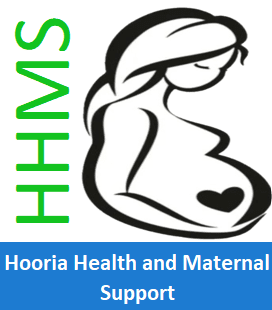Checklist: Signs of Postpartum Depression & When to Reach Out

Posted on October 20th, 2025
Introduction: You’re Not Alone, and You’re Not Failing
After birth, every mother experiences emotional ups and downs. But for some, those feelings linger and grow heavier with time. You may feel unlike yourself, tired, anxious, or disconnected from your baby, and wonder if it’s just exhaustion or something more.
If that sounds familiar, you’re not alone. 1 in 7 mothers experiences postpartum depression (PPD), and it’s not a sign of weakness. It’s a medical condition, one that can be treated with care, community, and compassion.
At Hooria Health and Maternal Support, we help mothers recognize the signs early, understand that healing is possible, and connect to culturally responsive support when it’s needed most.
1. Understanding the Difference: Baby Blues vs. Postpartum Depression
Baby blues are common and short-lived. They typically appear a few days after birth and fade within two weeks. You may feel emotional, cry easily, or feel overwhelmed, but these feelings come and go.
Postpartum depression, however, lasts longer and feels deeper. It can begin anytime within the first year after birth and often requires professional care and support.
2. The Checklist: Common Signs of Postpartum Depression
If you’re wondering whether what you’re feeling might be PPD, check for these signs. You don’t need to experience them all; even a few may indicate it’s time to reach out.
Emotional Signs
- Persistent sadness, emptiness, or tearfulness
- Irritability or anger that feels hard to control
- Feeling anxious, panicked, or constantly worried
- Guilt, shame, or feeling like you’re “not a good mother”
- Loss of interest in things you once enjoyed
Physical Signs
- Trouble sleeping even when you’re tired
- Changes in appetite or weight
- Fatigue or lack of energy that doesn’t improve with rest
- Aches, pains, or headaches without a clear cause
Behavioral Signs
- Withdrawing from family or friends
- Difficulty bonding with your baby
- Feeling disconnected from reality
- Thoughts of self-harm or fear of harming your baby
If you checked multiple boxes or any thoughts of harm appear, please reach out for help immediately. You deserve care and support right now.
3. Risk Factors to Be Aware Of
Some mothers are more vulnerable to postpartum depression because of:
• A personal or family history of depression or anxiety
• Difficult or traumatic birth experiences
• Lack of emotional or physical support
• Financial, housing, or relationship stress
• Isolation from family or cultural community
• Previous pregnancy loss or miscarriage
Knowing your risk factors doesn’t mean PPD is inevitable; it means you can prepare by building your support system early.
4. How to Talk About It
Talking about postpartum depression can be difficult, especially in communities where emotional struggles are misunderstood or stigmatized. Here are ways to start the conversation:
• With a loved one: “I’ve been feeling sad and unlike myself. Can you help me find support?”
• With a doctor or doula: “I’m worried about how I’ve been feeling lately. Can we talk about postpartum depression?”
• With a friend: “I don’t need advice, I just need someone to listen right now.”
You don’t have to have the perfect words; honesty is enough.
5. How Partners and Family Can Help
If you’re supporting a new mother, watch for these signs:
• She seems persistently sad, tired, or withdrawn
• She isn’t sleeping or eating normally
• She expresses guilt, shame, or hopelessness
• She avoids bonding with the baby or others
Offer gentle reassurance and practical help:
• Encourage rest and nourishment
• Listen without judgment
• Offer to make calls or appointments on her behalf
• Remind her that she’s not alone, and help is available
Sometimes, your voice of compassion can be the bridge to professional care.
6. Where to Turn for Support
Healing starts with connection. If you think you may have postpartum depression, reach out to:
• Your healthcare provider or OB-GYN
• A mental health counselor or therapist
• A postpartum doula trained in emotional support
• A local maternal health organization (like Hooria Health and Maternal Support)
If you ever have thoughts of harming yourself or your baby, please call or text 988 (the Suicide and Crisis Lifeline) for immediate help. You are not alone, and there is hope.
7. Healing Is Possible
With the right support, most mothers recover fully from postpartum depression. Treatment may include therapy, medication, community support, and lifestyle adjustments.
At Hooria Health and Maternal Support, we see recovery every day. Mothers who once felt hopeless regain joy, energy, and connection. Healing is not about being perfect; it’s about learning to accept help and rediscover strength.
Final Thoughts: Reaching Out Is a Sign of Strength
Postpartum depression doesn’t define you; it’s something you’re moving through. You deserve understanding, not silence. Support, not shame. Healing, not hiding.
If you or someone you love may be struggling, reach out to Hooria Health and Maternal Support. Our doulas and maternal wellness team provide gentle, culturally informed care for mothers navigating emotional challenges after birth.
Contact Hooria Health and Maternal Support today to start a confidential conversation about postpartum emotional wellness.
Contact Us
Reach Out Today
Explore our caring maternal health solutions designed for you. Connect with our team today and begin a journey towards empowerment and support for you and your family.
